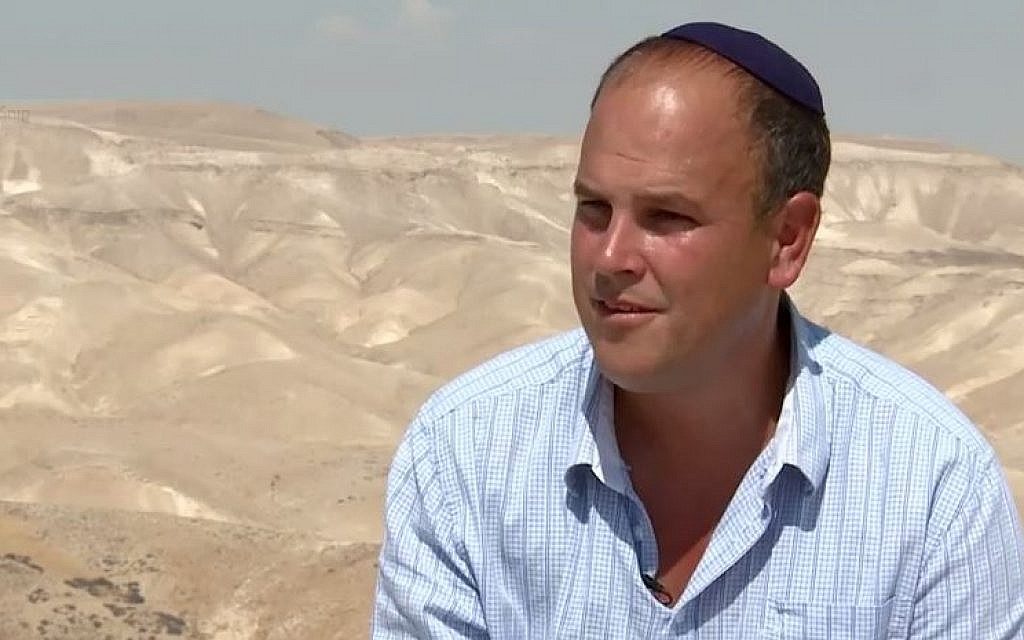Micah Goodman adds layers to Moshe as we know him, and explains how his last words introduced two huge revolutions, whose effects resonate with Jews and Israel today.
One of the latest literary surprises for me definitely was “Mose’s final speech”, published in Italy by Giuntina. The author, Micah Goodman, is part of the Global Forum of the National Library of Israel, is a researcher at the Jerusalem Shalom Hartman Institute and is Ein Prat director. Throughout the book he dives into Moshe legacy, looking at the huge changes he announces in his final speech: the idea that political power must be limited, and that religion, and specifically religious rituals, must not be observed in order to get something back. Moshe, who can perceive the dangers connected to sovereignty, tries to warn his people. He’s a man with a layered personality, who has a lot to say about today’s Jews and Israel as well.
I have begged Giuntina’s director, Shulim Vogelman, to put us in contact and let me interview him for JOIMag: what follows is the result of a series of emails, calls, and the collaboration with David Bidussa, also an author on this magazine.
When we came across your book, we felt that the subject of the book and the way that is written, and the method that you used, are really interesting in light of what JOI is trying to do here in Italy. So, the first question is: how did you get the idea of the book?
I always felt that Moshe had a very important message to say. The message comes out in the speech he gives in the book of Devarim [Deuteronomy]. But I found out this is a message he gives to people that are about to enter the land of Israel, and he understands there isn’t just a change in their location, in the geography, there’s a change in their politics. There is a change in their basic living conditions, and as an Israeli living in Israel, it was interesting for me to try to ask: what does Moshe have to say about power, what does he have to say about sovereignty? That’s what moved me to share my observations and insights with my fellow Israelis.
At the beginning of the book you write that you dedicate the book to whom wants to start looking out of the window opened by Moshe on biblical philosophy, but also to whom wants to really understand the challenges of modern Israel. Can you elaborate on that?
Well, there’s three challenges in the book of Devarim, which have everything to do with the challenges of the modern Israel and I would say of the modern Jews. One challenge is leaving the desert, hence entering a civilized land, which means to be exposed to foreign cultures, and there’s the question: how do you deal with foreign cultures? I think that’s relevant to Jews in the world today, right? How do you maintain the strong, inspired identity and still open to the world?
The second challenge of the book of Devarim is: how can you survive culturally without your leaders? Because Moshe dies. And I think that’s a big challenge that the Jewish world has, where we are living in an age where there isn’t a clear spiritual leader. Until the ‘90s there were very strong Jewish leaders. Mostly they died, not real replacement. And that’s what happens in Devarim, where Moshe is about to die, and he realizes that, and tries to deal with it.
And finally, I’ll go back to my first point, there’s a challenge of power. How do you deal with power, how you deal with wealth? Those are the three resemblances that I find relevant to our modern condition.
This leads us to our next question: which are the two revolutions that you describe in your book?
Moshe, right before dying, right before entering Israel, introduces a new way of thinking about religion, and a different way to think about politics. For what concerns the latter, he speaks about the idea that many people today would find even intuitive – and that is that power, sovereign government has to be limited: it’s the first time in history that this idea is created and born. The notion that there needs to be boundaries to what leaders can do. This idea is a political revolution. We are used to think about the roots of democracy in Athens. And that’s true: the idea that the government is chosen by the people is a Greek idea. The notion that you pose limits to governing, that is an ancient Jewish idea, and I think liberal democracies are a combination of those two ideas, where one comes from Athens and one comes from Jerusalem.
The second revolution is a different way to think about religion. According to sefer Devarim, religious rituals are not magical rituals: you don’t perform sacrifices to make something happen, in order to achieve results. You don’t do a rain dance. You perform these rituals not to control nature, but out of loyalty to your tradition and surrendering to God, which means these rituals don’t express power. And that is a very significant revolution. In the book I tried to link these revolutions, and I said: politics doesn’t lead to tyranny and religion doesn’t lead to magic.
One could say that in being a State you lose the experience of being a Diaspora which may be seen as the status of the exile. But if you look at the Diaspora not as an exile, but as a bet on the future, trying to find the balance between tradition and innovation, a genuine willingness to listening to the others. How much are we still ready and willing to listen to the others, whilst being a State?
I think it’s exactly the opposite. Because we have a State it is easier to us to be open to foreign cultures and listen to the others. I think the State enables our listening: because our identity is not under threat in Israel, when you live here you know your great-granddaughter will be Jewish. That confidence enables you to open up: there aren’t any risks in learning Christian philosophy, Buddhism… your Judaism is guaranteed. As a result, you can be more open minded. I really think Zionism could create a more open Judaism.
And this is something you feel is happening right now, or something to work toward to?
Well, Israel is a very complicated country [laughter]. There are many, many voices in Israel: there are voices that are very close minded, but there are very powerful, very rich voices that are saying exactly this. Statehood is the opportunity to open Judaism.
You analyse Moshe importance by looking at how Joshua lived by his teacher words, and how Solomon in a way distanced himself from it: what would you are the different legacies of these two personalities for today’s readers?
I think Solomon is the temptation of tyranny. Solomon is how wealth and success could lead to an illusion of merit. And Joshua is the other way around. He tells us that life is not what happens to us, but how we interpret what happens to us. I think that the Torah says that sometimes when good things happen to you it can ruin you if you don’t interpret them in the right way. If you a have a sense of gratitude, that will lead to generosity. Joshua is a manifestation of gratitude. It’s understanding that the good things that happen to you is not always you: is God, luck. It’s a sense of limits. They stand for two radically different models of how you react to wealth and success.
Who would you say embodies the most of Moshe’s leadership style today?
I can’t find anyone, but not because I don’t think we have great people. It’s because today leadership takes place on social media, and social media are very unfriendly for the Moshe type of leaders. Social media reward a type of leadership which is arrogant and vulgar. When people write things that are either very personal or very aggressive, very vulgar, it creates a lot of traffic. When people write their thoughts full of perplexity, nuances, those post don’t get shared. Social media is shaping messages, how people think and it isn’t a climate that cultivates the next great leader. Social media is ruining western democracies, is tearing us apart. I’m an optimist, but I feel technology, which is created to connected people, really divides us.
And as you say at the end of the book “maybe the time of Devarim is arrived for the third Israeli generation”. What do you mean by the time of Devarim has arrived? Are you optimistic for the future?
I speak every day to young people. I am very optimistic: in Israel you see religious young Israelis who are very open minded, and secular Israelis that are becoming more Jewish oriented. And these two moves together are creating something very powerful among young Israelis.
Do you have a message for our JOI friends and readers?
I think Jews in the words, we are brothers and sisters, we are connected. And what connects us, is ideas, books. A cultural connection doesn’t mean you have to agree with each other, it means you exchange ideas. And I am very happy to have this connection with JOI and fully support your effort in Italy.

